
In Greek mythology, Agamemnon was a king of Mycenae who commanded the Achaeans during the Trojan War. He was the son of King Atreus and Queen Aerope, the brother of Menelaus, the husband of Clytemnestra, and the father of Iphigenia, Iphianassa, Electra, Laodike, Orestes and Chrysothemis. Legends make him the king of Mycenae or Argos, thought to be different names for the same area. Agamemnon was killed upon his return from Troy by Clytemnestra, or in an older version of the story, by Clytemnestra's lover Aegisthus.

The Trojan War was a legendary conflict in Greek mythology that took place around the 12th or 13th century BCE. The war was waged by the Achaeans (Greeks) against the city of Troy after Paris of Troy took Helen from her husband Menelaus, king of Sparta. The war is one of the most important events in Greek mythology, and it has been narrated through many works of Greek literature, most notably Homer's Iliad. The core of the Iliad describes a period of four days and two nights in the tenth year of the decade-long siege of Troy; the Odyssey describes the journey home of Odysseus, one of the war's heroes. Other parts of the war are described in a cycle of epic poems, which have survived through fragments. Episodes from the war provided material for Greek tragedy and other works of Greek literature, and for Roman poets including Virgil and Ovid.

Troy Ancient Greek: Τροία, romanized: Troíā; Latin: Trōia; Hittite: 𒆳𒌷𒋫𒊒𒄿𒊭, romanized: Truwiša/Taruiša) or Ilion was an ancient city located in present-day Hisarlık, Turkey. The place was first settled around 3600 BC and grew into a small fortified city around 3000 BC. During its four thousand years of existence, Troy was repeatedly destroyed and rebuilt. As a result, the archeological site that has been left is divided into nine layers, each corresponding to a city built on the ruins of the previous. Archaeologists refer to these layers using Roman numerals. Among the early layers, Troy II is notable for its wealth and imposing architecture. During the Late Bronze Age, Troy was called Wilusa and was a vassal of the Hittite Empire. The final layers were Greek and Roman cities which in their days served as tourist attractions and religious centers because of their link to mythic tradition.

In Greek mythology, Menelaus was a Greek king of Mycenaean (pre-Dorian) Sparta. According to the Iliad, the Trojan war began as a result of Menelaus’s wife, Helen, fleeing to Troy with the Trojan prince Paris. Menelaus was a central figure in the Trojan War, leading the Spartan contingent of the Greek army, under his elder brother Agamemnon, king of Mycenae. Prominent in both the Iliad and Odyssey, Menelaus was also popular in Greek vase painting and Greek tragedy, the latter more as a hero of the Trojan War than as a member of the doomed House of Atreus.
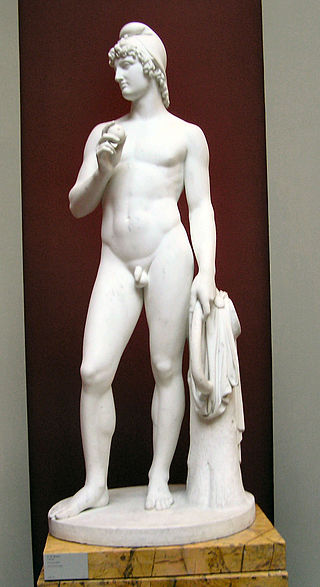
Paris, also known as Alexander, is a mythological figure in the story of the Trojan War. He appears in numerous Greek legends and works of Ancient Greek literature such as the Iliad. In myth, he is prince of Troy, son of King Priam and Queen Hecuba, and younger brother of Prince Hector. His elopement with Helen sparks the Trojan War, during which he fatally wounds Achilles.

Helen, also known as Helen of Troy, in Latin as Helena, beautiful Helen, Helen of Argos, or Helen of Sparta, was a figure in Greek mythology said to have been the most beautiful woman in the world. She was believed to have been the daughter of Zeus and Leda, and was the sister of Clytemnestra, Castor and Pollux, Philonoe, Phoebe and Timandra. She was married to King Menelaus of Sparta "who became by her the father of Hermione, and, according to others, of Nicostratus also." Her abduction by Paris of Troy was the most immediate cause of the Trojan War.

Troy is a 2004 epic historical war film directed by Wolfgang Petersen and written by David Benioff. Produced by units in Malta, Mexico and Britain's Shepperton Studios, the film features an ensemble cast led by Brad Pitt, Eric Bana, Sean Bean, Brian Cox, Brendan Gleeson and Orlando Bloom. It is loosely based on Homer's Iliad in its narration of the entire story of the decade-long Trojan War—condensed into little more than a couple of weeks, rather than just the quarrel between Achilles and Agamemnon in the ninth year. Achilles leads his Myrmidons along with the rest of the Greek army invading the historical city of Troy, defended by Hector's Trojan army. The end of the film is not taken from the Iliad, but rather from Quintus Smyrnaeus's Posthomerica, as the Iliad concludes with Hector's death and funeral.
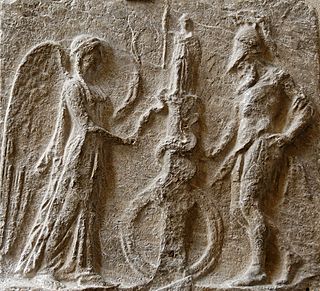
In Greek and Roman mythology, the Palladium or Palladion was a cult image of great antiquity on which the safety of Troy and later Rome was said to depend, the wooden statue (xoanon) of Pallas Athena that Odysseus and Diomedes stole from the citadel of Troy and which was later taken to the future site of Rome by Aeneas. The Roman story is related in Virgil's Aeneid and other works. Rome possessed an object regarded as the actual Palladium for several centuries; it was in the care of the Vestal Virgins for nearly all this time.

Helen of Troy is a 1956 epic historical drama film, based on Homer's Iliad and Odyssey. It was directed by Robert Wise, from a screenplay by Hugh Gray and John Twist, adapted by Hugh Gray and N. Richard Nash. The music score was composed by Max Steiner and the cinematography by Harry Stradling Sr, who shot the film in CinemaScope.

Giovanni Pastrone, also known by his artistic name Piero Fosco, was an Italian film pioneer, director, screenwriter, actor and technician.
In Greek mythology, Antenor was a counselor to King Priam of Troy during the events of the Trojan War.
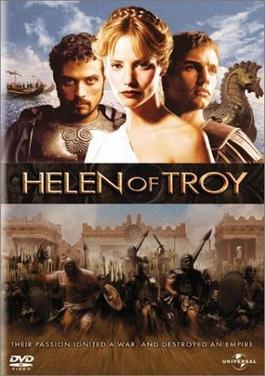
Helen of Troy is a 2003 British-American television miniseries based upon Homer's story of the Trojan War, as recounted in the epic poem, the Iliad.

Troia is a town and comune in the province of Foggia and region of Apulia in southern Italy.

Clytemnestra, in Greek mythology, was the wife of Agamemnon, king of Mycenae, and the half-sister of Helen of Troy. In Aeschylus' Oresteia, she murders Agamemnon – said by Euripides to be her second husband – and the Trojan princess Cassandra, whom Agamemnon had taken as a war prize following the sack of Troy; however, in Homer's Odyssey, her role in Agamemnon's death is unclear and her character is significantly more subdued.
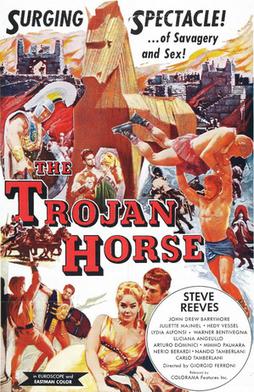
The Trojan Horse is a 1961 Italian peplum film set in the tenth and final year of the Trojan War. The film focuses primarily on the exploits of the Trojan hero Aeneas during this time. The film was directed by Giorgio Ferroni and stars Steve Reeves as Aeneas and John Drew Barrymore as Odysseus.
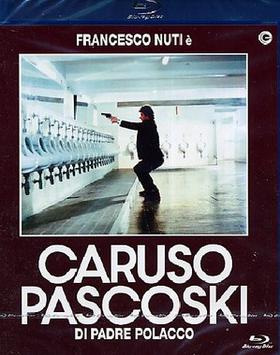
Caruso Pascoski, Son of a Pole is a 1988 Italian comedy film directed by Francesco Nuti.

Lidia Quaranta, also known with the stage name of Lydia Quaranta, was an Italian stage and film actress of the early 20th century.
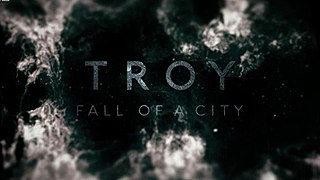
Troy: Fall of a City is a British-American historical drama television miniseries based on the Trojan War and the love affair between Paris and Helen. The show tells the story of the 10-year siege of Troy, set in the 13th century BC. It is not an adaptation of Homer's Iliad or Odyssey but rather an original take on the Greek myths, and covers some ground only alluded to in those works. The series was commissioned by BBC One and is a co-production between BBC One and Netflix, with BBC One airing the show on 17 February 2018 in the United Kingdom, and Netflix streaming the show internationally outside the UK.
Troy is an opera in two acts by Bujor Hoinic set to a Turkish-language libretto by Artun Hoinic, based on the ancient Greek epic poem Iliad by Homer. It premiered in Ankara, Turkey, in 2018 and was restaged at Bolshoi Theatre in Moscow, Russia, in 2019.

Itala Film was an Italian film production company.


















